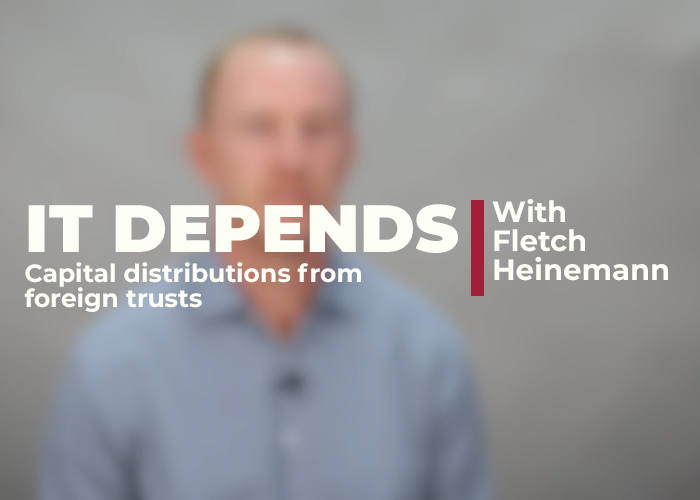In this edition of It depends, partner Scott Hay-Bartlem discusses whether your superannuation death benefit can be paid to your siblings. ...

In this edition of ‘It depends’, partner Fletch Heinemann talks about distributions from foreign trusts and the amount that is subject to tax under section 99B.
Welcome to It Depends. Today we’re talking about distributions from foreign trusts.
In Australia we have a section called section 99B, which applies when there’s particular distributions of capital from foreign trusts. Now section 99B is a particularly difficult section for income tax purposes because unlike most of our provisions it taxes capital amounts, not income. It was introduced in the 1970s to deal with the specific avoidance problem that was happening at the time where Australian residents had the ability to set up foreign trusts and accumulate income in those foreign trusts and then basically not pay any tax when those capital amounts were distributed to them as Australian resident beneficiaries. Now that all pre dated CGT and it also pre dated the general anti-avoidance rules. So, the problem that we’ve got at the moment with section 99B is that it continues to apply and to situations that certainly aren’t within the scope of the anti-avoidance provisions.
Section 99B applies where we’ve got property of a trust estate. Now a trust estate can be things like a discretionary trust, it can also be a testamentary trust. In some cases it will be the deceased estate and also in some cases we’ve seen what we think are foreign superannuation funds are actually trusts to which section 99B can apply. The property of that trust estate must be either paid to or applied for the benefits of an Australian resident beneficiary, and one of the traps here is that the person can be an Australian resident beneficiary at any time in the year of income. So, somebody who’s either coming to Australia or departing Australia, if they were a resident of Australia at any time during that income year section 99B potentially applies, even though at the time they received the distribution they weren’t an Australian tax resident.
In terms of calculating the amount that’s subject to section 99B, the rules say that the whole amount of the capital that’s distributed to the Australian resident beneficiary forms part of their assessable income in Australia. There are no capital losses or net capital gains available to be applied against those amounts and the amount is a type of statutory income. So, it’s deemed to be the assessable income of the Australian resident beneficiary and it will be taxed at their marginal rates. So, typically up to $0.45 cents in the dollar. We then have to work out if there are amounts that we can reduce from that and the main ones that we see are amounts of capital that essentially they were derived by the foreign trusts. But if they had been derived by an Australian resident taxpayer they would not have been subject to tax in Australia. So, essentially what that provision is trying to do is say if these amounts wouldn’t have been subject to tax in Australia, then they won’t be taxed under section 99B. However, if the amounts would have been taxed in Australia, they will be subject to 99B. So, we think about interest, dividends, distributions from other trusts and the big one is capital gains. If they’re not taxed in the foreign jurisdiction, potentially that becomes a significant exposure under section 99B.
Well it depends. There are a whole set of circumstances as to when section 99B will not apply. It really depends on the facts of the particular case. In certain circumstances we find that the temporary resident provisions might actually disable section 99B, so that’s one of the first things to check. Assuming section 99B does apply, the next step is to identify how much would be subject to section 99B and also whether any foreign income tax offsets are available to then reduce that section 99B amount. In all of these cases, the key is to understand what the section 99B amount would be, before any distribution is made or before any of that property is applied for the benefit of the Australian resident beneficiary. If we know what the section 99B risk might be, we can then take steps to manage that risk. Please contact a member of our team if you would like to discuss.
This publication is for information only and is not legal advice. You should obtain advice that is specific to your circumstances and not rely on this publication as legal advice. If there are any issues you would like us to advise you on arising from this publication, please let us know.
Subscribe to our interest lists to receive legal alerts, articles, event invitations and offers.
Cooper Grace Ward acknowledges and pays respect to the past, present and future Traditional Custodians and Elders of this nation and the continuation of cultural, spiritual and educational practices of Aboriginal and Torres Strait Islander peoples.
Fast, accurate and flexible entities including companies, self-managed superannuation funds and trusts.